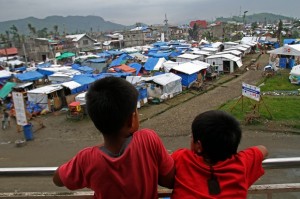Land rights issues seen to derail rehab efforts in Yolanda areas
MANILA, Philippines—Long-standing and emerging issues over lack of land tenure security may be a major stumbling block to rehabilitation efforts in Yolanda-affected areas if not addressed strategically, says a report released by international non-government organization Oxfam.
The destruction caused by Yolanda surfaced the urgent need to address policies on land use and agrarian reform that might impact planned relocation and livelihoods initiatives.
Yolanda– known internationally as Haiyan – was the strongest typhoon ever recorded at landfall. It killed more than 6,000 people and displaced 4.1 million persons.
Oxfam’s study, “Beyond Safe Land: Why security of land tenure is crucial in the Philippines post-Haiyan Recovery”, is based on fieldwork covering areas affected by Yolanda: Bantayan Island in Cebu; Tacloban City, Tanauan, and Palo in Leyte; and Guiuan and Quinapondan in Samar. Even prior to Yolanda, more than a third of the total population of Eastern Visayas (32 percent) are among the landless in this region, while four out of ten are poor (45.5 percent).
The report says lack of secure access to land in both urban and rural communities is closely linked to poverty. The striking degree of tenure informality correlates with one of the highest rates of poverty in the country, the paper reports. It further cited that displaced people who are already poor, and have no legal claim to land, are more likely to fall deeper into poverty and move back to locations that are unsafe.
Article continues after this advertisement“Insecurity of land tenure creates cycles of vulnerability. As natural disasters are predicted to be more frequent, lack of land tenure continues to reduce resilience and increase inequality in the Philippines,” said Oxfam country director Justin Morgan. “Typhoon Yolanda gives us the opportunity to address this issue by including it in the country’s rehabilitation and reconstruction agenda.”
Article continues after this advertisementPresident Benigno Aquino III’s statement about ensuring the completion of agrarian reform targets as among the administration’s priorities in his recent State of the Nation Address (Sona) is most welcome.
The President specifically declared the urgency of a bill extending the filing of Notices of Coverage in agrarian reform areas. A few days later, he certified as urgent the passing of the National Land Use Act, which is now pending before the Senate.
According to Oxfam’s study, the prevalent lack of secure access to land in Yolanda-affected areas exposes the poor to constant threats of eviction and loss of livelihoods during the rehabilitation and relocation stage. Evidence of this arises from government proposals to move as many as 200,000 people away from the seashore as part of its relocation efforts.
Anthony Marzan, president of the network of NGOs called Agrarian Reform Network, Inc. and convenor of the multi-sectoral group Campaign for Land Use Policy Now!, emphasized the importance of protecting the land tenure security of the small farmers especially during times of disaster: “In agricultural communities, farmers, tenants and farm workers with insecure land tenure can also potentially miss out on opportunities for livelihoods recovery after Typhoon Haiyan.
The vulnerability to eviction is not only imminent to coconut tenant farmers and farm workers because their trees have been destroyed, but also for all landless farmers and farm workers and existing agrarian reform beneficiaries in the region.”
After the disaster, landless families have fewer options in rebuilding their lives. Interviews with community leaders and displaced persons in several areas in Leyte, Eastern Samar and Northern Cebu, revealed cases where informal settlers have been prohibited from returning to their former homes.
Those with no legal claim to land may also be excluded from the government’s relocation efforts. In interviews with officials of local government units, Oxfam found out that without a uniform guideline on the selection of potential beneficiaries for relocation, displaced tenants may not be eligible for relocation because only land owners are viewed to have lost properties. Thus, tenants are left on their own to just rent somewhere else.
While government program guidelines establish relocation eligibility based on poverty, provisions requiring targeted beneficiaries to have land ownership or long-term occupation of lands may exclude a large number of people displaced by Yolanda.
Thus, Oxfam’s report urges the government to guarantee ownership or long-term occupation for informal settlers and lessees in resettlement areas, otherwise there is an increased probability for them to return to unsafe lands.
Oxfam calls on the government to ensure that the recovery and rehabilitation efforts in Yolanda-affected areas are inclusive and sustainable, providing measures that safeguard tenure security of the landless who have been displaced by the typhoon.
“Recovery and rehabilitation is not just about building better, it is about reducing poverty by increasing resiliency and equality. If the Philippines continues to ignore the country’s land issues, the poor will only become poorer every time a natural disaster hits the country,” Morgan said.
RELATED STORIES
‘Stronger leadership needed in Yolanda aftermath’
Gov’t urged to heed UN report’s warnings on climate change
